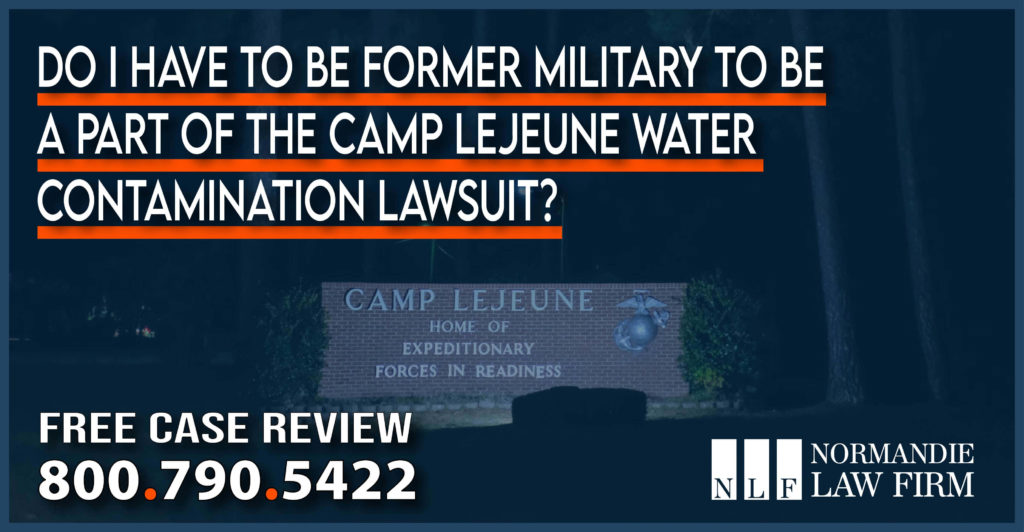
Very recently, those exposed to the contaminated water at Camp Lejeune gained the right to file a lawsuit for the medical conditions that they developed after being exposed to contaminated water at the Marine Corp base camp. If you are interested in learning more about your right to file a lawsuit, do not hesitate to seek legal assistance with the experts here at our law firm as soon as possible.
Here at the Normandie Law Firm, our lawyers are ready to handle your claim and help you recover the settlement that you are owed. Our lawyers have decades of experience handling all sorts of claims, including injury claims and wrongful death claims. Our experts are ready to handle your Camp Lejeune water contamination lawsuit and help you recover the settlement that you are owed.
A Quick History of the Water Contamination at Camp Lejeune
Between 1953 and 1987, the water at Camp Lejeune, a Marine Corp base camp in Jacksonville, North Carolina, was highly contaminated with multiple toxins. The water was contaminated with Tetrachloroethylene (PCE or PERC), Trichloroethylene (TCE), Vinyl Chloride, and Benzene. The contamination came from multiple sources, including leaking fuel tanks, improperly disposed industrial waste, and a nearby business that was leaking chemicals. Unfortunately, leadership at the base was aware of the water contamination but failed to take any action whatsoever.
These innocent parties and their loved ones developed severe health conditions. These health conditions included the following: aplastic anemia (and related syndromes), bladder cancer, breast cancer, esophageal cancer, female infertility, hepatic steatosis, kidney cancer, leukemia, liver cancer, lung cancer, miscarriage, multiple myeloma, myelodysplastic syndromes, neurobehavioral effects, non-Hodgkin’s lymphoma, Parkinson’s disease, renal toxicity, and scleroderma. Unfortunately, many of the affected parties lost their lives due to these dangerous health conditions.

About the PACT Act
On August 10, 2022, President Biden signed the PACT Act into law. The PACT Act gives all those who suffered harm, including the development of severe medical conditions and death, the right to sue the government. The PACT Act creates a two-year window from the date that the law was signed for the parties affected by the water contamination at Camp Lejeune to file their lawsuit with the United States District Court for the Eastern District of North Carolina. The law gives veterans and civilians the right to sue and recover damages. Potential damages include medical costs, disability benefits, lost pay, and pain and suffering. In addition, claimants could potentially recover compensation for mental health services and counseling expenses. The PACT Act covers the more than a million Marines, military service members, contractors, civilians, and their families that lived at or worked at the military base between 1953 and 1987. For more information about the PACT Act and whether you could sue under this new law, do not hesitate to contact the experts at our law firm today.
Who has the Right to Sue?
Our law firm has been contacted by countless people looking for more information about taking legal action after being exposed to the contaminated water at Camp Lejeune. Some of the questions that we have received so far include the following:
- Do I have to be former military?
- Do I have to be former US Army?
- Do I have to be former Navy?
- Do I have to be former Marine?
- Do I have to be former Airforce?
- Am I eligible to be a part of the Camp Lejeune water contamination lawsuit?
- Can non-military personnel file a claim?
These are all valid questions. Based on the PACT Act, those who were stationed at, lived at, or worked at Camp Lejeune between 1953 and 1987 for at least 30 days, could be eligible to file a lawsuit. Of course, this applies to veterans – but this also applies to civilian family members living on the base, non-military staff, contractors, pregnant mothers, and family of the deceased.
Although most of the affected parties are former military, specifically, former Marines, many other parties – including other military service members, non-military staff, contractors, and their families – were also affected. All of these parties now have the right to file a lawsuit under the PACT Act.
What if I was not military personnel? You can sue even if you were not military staff. Under the PACT Act, anyone who can prove that they or a love one lived at or worked at the base camp for at least 30 days between 1953 and 1987 can potentially have grounds to file a claim and recover compensation.
For more information about whether you have the right to file a lawsuit, do not hesitate to seek legal assistance with the experts here at our law firm as soon as possible.
Ineligibility to File a Lawsuit under the PACT Act
Those who were dishonorably discharged or are the family of someone who was dishonorably discharged is ineligible to file a claim. What does this mean? If you were a military service member that was dishonorably discharged, you will be ineligible to file a claim. Likewise, if you were the family member of a servicemember that was dishonorably discharged, you will also be ineligible to file a claim. If you are unsure of whether you are eligible or ineligible to file a lawsuit for the harm that you or a loved one suffered after being exposed to the contaminated water at the camp, do not hesitate to seek legal assistance with the experts at our law firm as soon as possible.

Am I Eligible for Compensation Under the PACT Act?
Yes – you could be eligible to recover compensation under the PACT Act, given that you meet the eligible requirements mentioned above. The compensation that you could be eligible to receive could include the following:
- Medical expenses
- Mental health and counseling expenses
- Lost income
- Disability benefits
- Pain and suffering
- Funeral and burial costs
- Punitive damages
- Legal fees
For more information about the type and amount of compensation that you could be eligible to receive if your claim is successful, do not hesitate to contact the experts here at our law firm. Our lawyers are more than ready to fight for your rights and help you recover the settlement that you are owed.
How Long Do I Have to Sue?
Under the PACT Act, you will have a two-year window (from August 10, 2022) to file your lawsuit. This means that you will have until August 2024 to file your lawsuit for the harm suffered due to the exposure to the contaminated water supply at Camp Lejeune. Of course, if you fail to file your claim on time, you could lose your right to file your lawsuit. For more information about the time that you have to sue and get recovery under the PACT Act, contact us today.
Contact Normandie Law Firm
Here at the Normandie Law Firm, our lawyers have decades of experience handling all sorts of claims and are more than ready to help you recover the settlement that you are owed. If you are ready to speak with an expert to learn more about your legal options, contact us today. We offer free legal services, which include free consultations and free second opinions. During these free legal services, our lawyers will be available to answer all your questions and address all your concerns – our experts will provide you with the guidance that you need to begin or continue your claim. To benefit from these free legal services, contact the experts at our law firm immediately.
Our Zero-Fee guarantee ensures that you will never be required to pay any upfront legal costs for any of our legal services. In addition, because we work on contingency, our clients will not be required to pay any legal fees until after winning their claims. If you do not win, you will not be required to pay.
Other Pages on Our Website Related to This Topic
Lawyer for Breast Cancer Camp Lejeune Lawsuit
Lawyer for Leukemia Camp Lejeune Lawsuit
Camp Lejeune Water Contamination Cancer Lawyers











